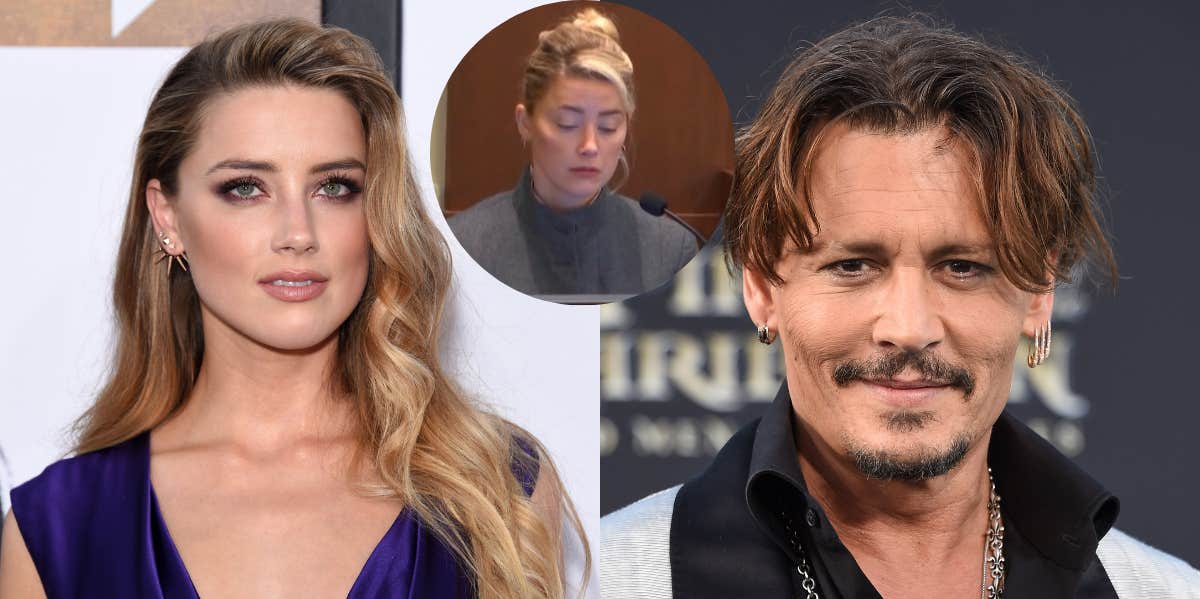Amber Heard Says Her Domestic Abuse Essay Was 'Not About Johnny'
The essay is the basis of Depp's defamation claim.
 DFree | Shutterstock
DFree | Shutterstock As court proceedings in the defamation trial between Johnny Depp and Amber Heard continued on Monday in Virginia, Heard took the stand once more, speaking about the 2018 op-ed she'd written for The Washington Post.
The aforementioned essay, titled 'I spoke up against sexual violence — and faced our culture’s wrath. That has to change,' is the basis of Depp's defamation lawsuit against his ex-wife.
Though he is not named in the piece, Depp claimed the article falsely accused him of being abusive towards Heard during their marriage and damaged his career in Hollywood.
Amber Heard says her Washington Post op-ed was 'not about Johnny.'
While on the stand, Heard had been asked if there was any ill will or bad intentions she may have had against Depp when she decided to publish her 2018 op-ed, to which Heard insisted that there was "none."
Heard said that the article was about her experience after her marriage with Depp ended. "It's not about Johnny. The only one who thought it was about Johnny is Johnny," she said.
"It’s about me. It’s about what happened to me after Johnny. It’s about what happened to me after I escaped my marriage," she continued.
The article, which was drafted with the help of the American Civil Liberties Union, for which Heard is an ambassador, was focused primarily on women's issues in this country.
Heard had also sought out legal advice before the op-ed was published because she didn't want any retaliation from Depp.
"I didn't want to have any sort of legal problems for talking about what happens to women when they talk about people who are more powerful," Heard said.
"I was trying to raise awareness around some of the issues that I just mentioned," she continued. The actress added that she was happy to weigh in on what women experience "when they come forward against somebody more powerful when they speak up about gender-based violence."
In the op-ed, Heard wrote about the "culture's wrath" that women face when they come forward with allegations of abuse.
“Like many women, I had been harassed and sexually assaulted by the time I was of college age. But I kept quiet — I did not expect filing complaints to bring justice. And I didn’t see myself as a victim,” Heard wrote.
"Then two years ago, I became a public figure representing domestic abuse, and I felt the full force of our culture’s wrath for women who speak out.”
Depp claims Heard's essay led to him losing job opportunities.
During Depp's testimony, he told the court that it "felt like somebody had hit me in the back of the head with a 2x4" when he'd read Heard's op-ed.
“Even if I had done an interview to try to explain myself, it turned into a hit piece,” Depp said, adding that he learned that he had been dropped from the 'Pirates of the Caribbean' franchise “two or three days after this op-ed appeared."
Depp also accused his ex-wife of strategically timing the publication of the essay to maximize publicity for her role in the film 'Aquaman.'
However, Heard spoke about how she'd hoped the premiere of the movie would drive more traffic towards her essay.
"The publicity of the movie and the success of the movie would hopefully, in the best-case scenario ... lend attention to the issues the op-ed was meant to address."
Nia Tipton is a writer living in Brooklyn. She covers pop culture, social justice issues, and trending topics. Follow her on Instagram.

